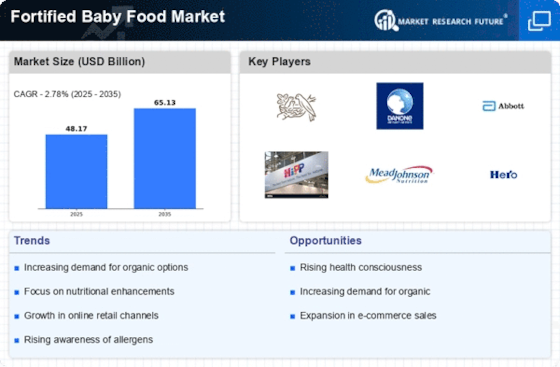Top Industry Leaders in the Fortified Baby Food Market

The Fortified Baby Food Market is a dynamic segment within the broader food industry, dedicated to providing nutritionally enriched options for infants. This analysis delves into the competitive landscape of the market, examining key players, their strategies, market share determinants, emerging entities, industry news, ongoing investment trends, and the overall competitive scenario in 2023.
Key Players:
Kraft Heinz Foods Company (US)
Abbott Laboratories (US)
Beech-Nut Nutrition Corporation (US)
Deutsches Milchkontor GmbH (Germany)
Danone S.A. (France)
The Hain Celestial Group
Inc. (US)
Reckitt Benckiser Group plc (UK)
Nestlé S.A. (Switzerland)
Bellamy's Organic (Australia)
Hipp GmbH & Co. Vertrieb KG (Germany)
Strategies Adopted:
Strategies adopted by key players in the Fortified Baby Food Market are diverse and focus on factors such as product innovation, brand visibility, market expansion, and adherence to regulatory standards. Product innovation remains a central strategy, with companies continually introducing new fortified baby food formulations that meet or exceed nutritional guidelines.
Brand visibility is crucial in a market where consumer choices are often influenced by recognized and trusted brands. Key players invest in marketing and promotional activities to enhance their brand presence, leveraging social media, partnerships with healthcare professionals, and strategic alliances with retailers to increase consumer awareness.
Market expansion is pursued through geographical diversification and partnerships. Key players often seek to enter emerging markets or strengthen their presence in established ones. Collaborations with local distributors and retailers facilitate broader market reach.
Adherence to regulatory standards is a fundamental aspect of the strategies adopted by key players in the fortified baby food sector. Given the sensitivity of the target consumer group—infants—companies prioritize strict compliance with nutritional guidelines and safety standards set by regulatory bodies.
Market Share Analysis:
The Fortified Baby Food Market is influenced by various factors, including brand reputation, distribution networks, adherence to quality standards, and consumer trust. Companies with strong brand reputations and a history of producing high-quality baby food tend to command a larger share of the market.
Distribution networks play a pivotal role in market share, with companies that have extensive and efficient supply chains gaining a competitive advantage. Accessibility in pharmacies, supermarkets, and e-commerce platforms is vital, ensuring that fortified baby food products are readily available to consumers.
Adherence to quality standards is crucial for market share analysis in this segment. Companies that consistently deliver products meeting stringent nutritional guidelines and safety standards enhance consumer trust and loyalty, contributing to increased market share.
Consumer trust is a significant determinant of market share. Companies that establish themselves as trustworthy providers of fortified baby food, often through transparent labeling, communication of nutritional benefits, and responsiveness to consumer concerns, are better positioned to capture a larger market share.
News & Emerging Companies:
The Fortified Baby Food Market often revolves around new product launches, partnerships with healthcare professionals, and research collaborations. Emerging companies in the sector typically focus on innovative formulations, organic ingredients, and novel packaging, contributing to the market's evolution.
Industry news also highlights initiatives by key players to provide educational resources for parents, reinforcing their commitment to infant nutrition and overall child development. Emerging companies often leverage unique nutritional profiles and natural ingredients to differentiate their offerings.
Industry Trends:
The Fortified Baby Food Market revolve around nutritional research, sustainability, and technological innovation. Companies invest in ongoing nutritional research to enhance the effectiveness of fortified baby food formulations, ensuring that they align with the latest scientific understanding of infant nutrition.
Sustainability is a growing focus, with companies allocating resources to reduce their environmental footprint. This includes efforts to adopt eco-friendly packaging, responsibly sourced ingredients, and efficient supply chain practices.
Technological innovation is essential for maintaining product quality and safety. Investments in advanced manufacturing technologies and quality control processes ensure that fortified baby food products meet or exceed the highest industry standards.
Competitive Scenario:
The Fortified Baby Food Market is characterized by intense competition among key players who strive to differentiate themselves through product innovation, brand strength, and a commitment to infant health. Established players leverage their global presence, distribution networks, and adherence to quality standards, while emerging companies contribute to market diversity and innovation.
The market's competitiveness is also shaped by factors such as pricing strategies, promotional activities, and the ability to adapt to evolving parental preferences. Companies that successfully balance providing reliable, well-known products with introducing innovative, nutritionally sound options are better positioned to thrive in this competitive landscape.
Recent Development
The Fortified Baby Food Market was the increased emphasis on organic and clean-label options. Several key players responded to the rising demand for natural and minimally processed baby food by introducing fortified formulations that prioritize organic ingredients and transparent labeling. This development reflects the industry's responsiveness to parental preferences for clean and nutritionally enriched options for their infants.


